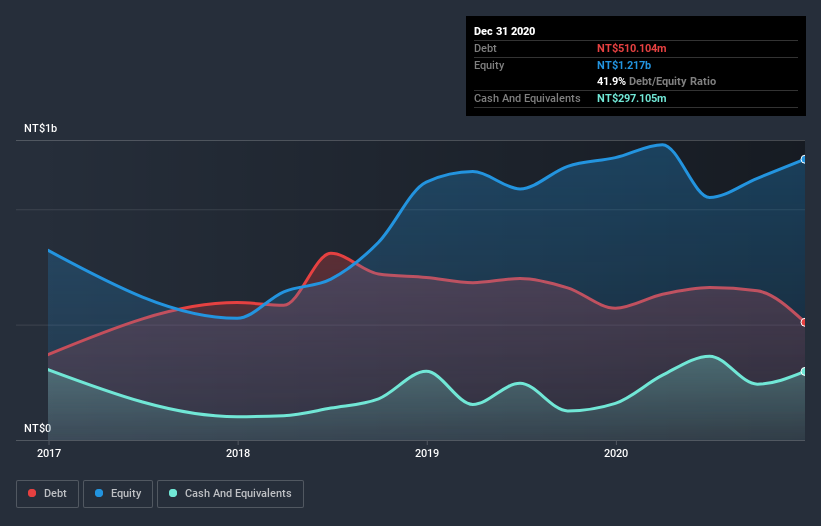Is Fulin Plastic Industry (Cayman) Holding (TPE:1341) Using Too Much Debt?

Some say volatility, rather than debt, is the best way to think about risk as an investor, but Warren Buffett famously said that 'Volatility is far from synonymous with risk.' So it might be obvious that you need to consider debt, when you think about how risky any given stock is, because too much debt can sink a company. We can see that Fulin Plastic Industry (Cayman) Holding Co., Ltd. (TPE:1341) does use debt in its business. But should shareholders be worried about its use of debt?
What Risk Does Debt Bring?
Generally speaking, debt only becomes a real problem when a company can't easily pay it off, either by raising capital or with its own cash flow. If things get really bad, the lenders can take control of the business. However, a more frequent (but still costly) occurrence is where a company must issue shares at bargain-basement prices, permanently diluting shareholders, just to shore up its balance sheet. By replacing dilution, though, debt can be an extremely good tool for businesses that need capital to invest in growth at high rates of return. The first thing to do when considering how much debt a business uses is to look at its cash and debt together.
Check out our latest analysis for Fulin Plastic Industry (Cayman) Holding
How Much Debt Does Fulin Plastic Industry (Cayman) Holding Carry?
You can click the graphic below for the historical numbers, but it shows that Fulin Plastic Industry (Cayman) Holding had NT$510.1m of debt in December 2020, down from NT$571.2m, one year before. However, because it has a cash reserve of NT$297.1m, its net debt is less, at about NT$213.0m.

A Look At Fulin Plastic Industry (Cayman) Holding's Liabilities
According to the last reported balance sheet, Fulin Plastic Industry (Cayman) Holding had liabilities of NT$772.4m due within 12 months, and liabilities of NT$132.1m due beyond 12 months. Offsetting these obligations, it had cash of NT$297.1m as well as receivables valued at NT$429.6m due within 12 months. So its liabilities total NT$177.7m more than the combination of its cash and short-term receivables.
Of course, Fulin Plastic Industry (Cayman) Holding has a market capitalization of NT$3.60b, so these liabilities are probably manageable. However, we do think it is worth keeping an eye on its balance sheet strength, as it may change over time.
We use two main ratios to inform us about debt levels relative to earnings. The first is net debt divided by earnings before interest, tax, depreciation, and amortization (EBITDA), while the second is how many times its earnings before interest and tax (EBIT) covers its interest expense (or its interest cover, for short). Thus we consider debt relative to earnings both with and without depreciation and amortization expenses.
Fulin Plastic Industry (Cayman) Holding has a low net debt to EBITDA ratio of only 0.43. And its EBIT easily covers its interest expense, being 44.7 times the size. So you could argue it is no more threatened by its debt than an elephant is by a mouse. Fortunately, Fulin Plastic Industry (Cayman) Holding grew its EBIT by 9.2% in the last year, making that debt load look even more manageable. The balance sheet is clearly the area to focus on when you are analysing debt. But it is Fulin Plastic Industry (Cayman) Holding's earnings that will influence how the balance sheet holds up in the future. So when considering debt, it's definitely worth looking at the earnings trend. Click here for an interactive snapshot.
Finally, a business needs free cash flow to pay off debt; accounting profits just don't cut it. So the logical step is to look at the proportion of that EBIT that is matched by actual free cash flow. In the last three years, Fulin Plastic Industry (Cayman) Holding's free cash flow amounted to 30% of its EBIT, less than we'd expect. That's not great, when it comes to paying down debt.
Our View
Happily, Fulin Plastic Industry (Cayman) Holding's impressive interest cover implies it has the upper hand on its debt. But truth be told we feel its conversion of EBIT to free cash flow does undermine this impression a bit. Taking all this data into account, it seems to us that Fulin Plastic Industry (Cayman) Holding takes a pretty sensible approach to debt. That means they are taking on a bit more risk, in the hope of boosting shareholder returns. There's no doubt that we learn most about debt from the balance sheet. However, not all investment risk resides within the balance sheet - far from it. We've identified 2 warning signs with Fulin Plastic Industry (Cayman) Holding , and understanding them should be part of your investment process.
If you're interested in investing in businesses that can grow profits without the burden of debt, then check out this free list of growing businesses that have net cash on the balance sheet.
When trading Fulin Plastic Industry (Cayman) Holding or any other investment, use the platform considered by many to be the Professional's Gateway to the Worlds Market, Interactive Brokers. You get the lowest-cost* trading on stocks, options, futures, forex, bonds and funds worldwide from a single integrated account. Promoted
New: AI Stock Screener & Alerts
Our new AI Stock Screener scans the market every day to uncover opportunities.
• Dividend Powerhouses (3%+ Yield)
• Undervalued Small Caps with Insider Buying
• High growth Tech and AI Companies
Or build your own from over 50 metrics.
This article by Simply Wall St is general in nature. It does not constitute a recommendation to buy or sell any stock, and does not take account of your objectives, or your financial situation. We aim to bring you long-term focused analysis driven by fundamental data. Note that our analysis may not factor in the latest price-sensitive company announcements or qualitative material. Simply Wall St has no position in any stocks mentioned.
*Interactive Brokers Rated Lowest Cost Broker by StockBrokers.com Annual Online Review 2020
Have feedback on this article? Concerned about the content? Get in touch with us directly. Alternatively, email editorial-team (at) simplywallst.com.
About TWSE:1341
Fulin Plastic Industry (Cayman) Holding
Fulin Plastic Industry (Cayman) Holding Co., Ltd.
Flawless balance sheet with solid track record.
Market Insights
Community Narratives



